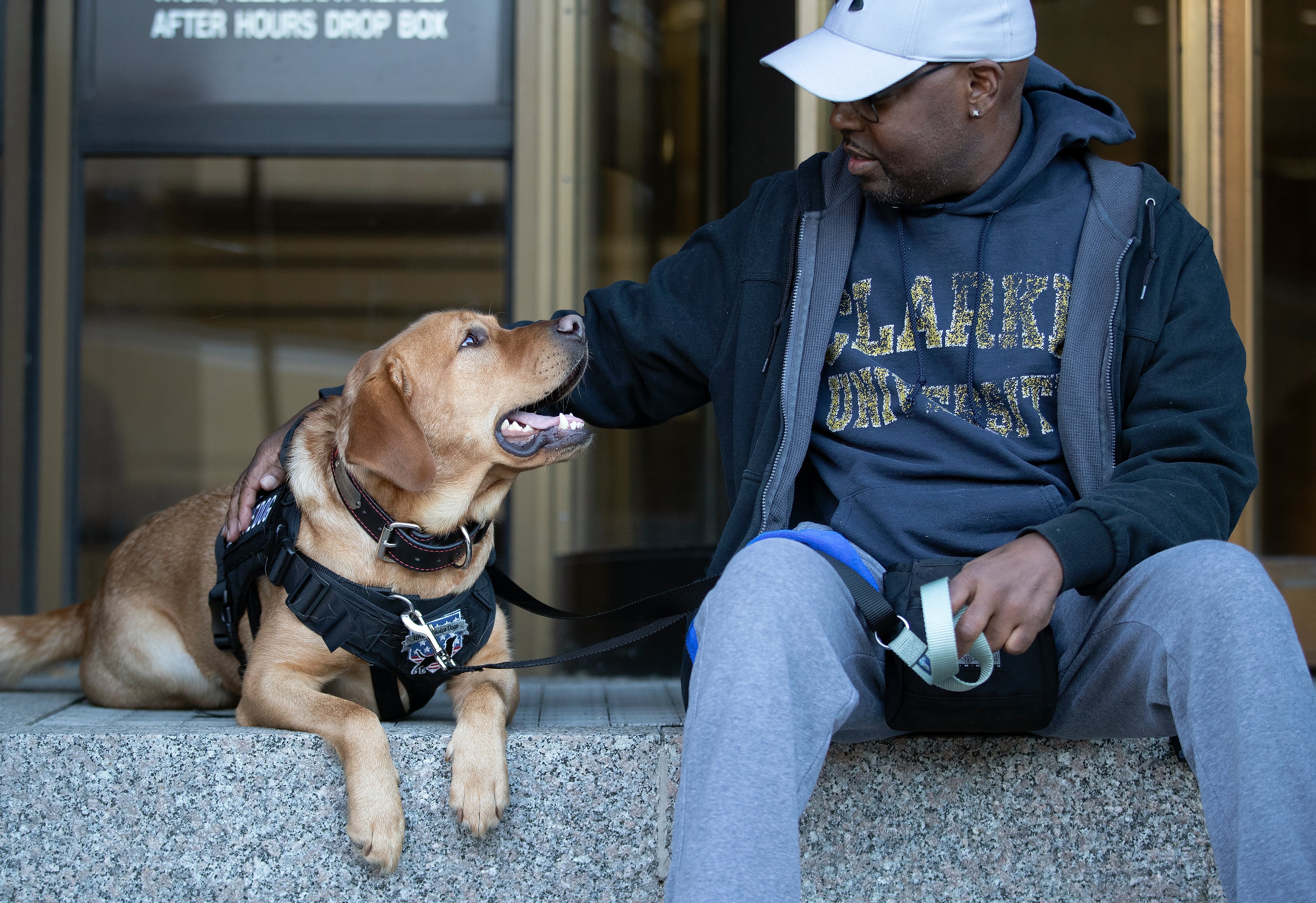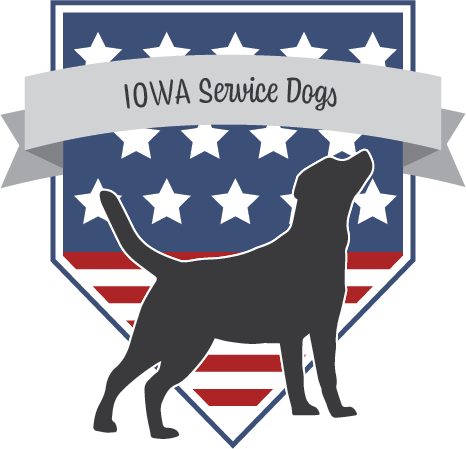How to Get a Service Dog in Iowa? So to get a service dog in Iowa, you must have a qualifying disability and apply through a reputable organization. The process typically involves an application, assessment, and training for the dog and handler.
Service dogs provide essential support to individuals with disabilities, enhancing their independence and quality of life. In Iowa, the process to obtain a service dog involves understanding legal definitions and meeting specific requirements. These dogs are trained to perform tasks that mitigate their handler’s disability, which can range from mobility assistance to alerting their owner to medical emergencies.
It’s vital to research accredited organizations that specialize in service dog training and placement. Knowing the steps and requirements can help streamline the process and ensure you find the right support for your needs.
Table of Contents
Introduction To Service Dogs In Iowa
Service dogs play a vital role in supporting individuals with disabilities. In Iowa, these trained companions offer help in various situations. Understanding what service dogs are and their benefits can guide you in the process of acquiring one.
What Is A Service Dog?
A service dog is a specially trained animal. They assist people with disabilities. Under the Americans with Disabilities Act (ADA), service dogs perform tasks for their handlers.
- Guide dogs for the visually impaired
- Hearing dogs for the hearing impaired
- Mobility assistance dogs
- Medical alert dogs
- Psychiatric service dogs
Service dogs must be trained to perform specific tasks. They are not just pets. They have legal protections under federal law.
Benefits Of Having A Service Dog
Service dogs provide numerous benefits for their handlers. Here are some key advantages:
| Benefit | Description |
|---|---|
| Increased Independence | Service dogs help individuals perform daily tasks. |
| Emotional Support | They offer companionship and reduce anxiety. |
| Improved Safety | Service dogs can alert to dangers or medical issues. |
| Social Interaction | They encourage interactions with others. |
Owning a service dog can change lives. These dogs bring joy, comfort, and support. They help create a more fulfilling life for individuals with disabilities.

Credit: www.armytimes.com
Eligibility Criteria For Obtaining A Service Dog
Understanding the eligibility criteria for obtaining a service dog is essential. Service dogs provide vital support to individuals with disabilities. Knowing the specific requirements helps streamline the process.
Qualifying Disabilities
Service dogs assist individuals with various disabilities. Here are some common qualifying disabilities:
- Mobility Impairments: Conditions affecting movement.
- Visual Impairments: Blindness or severe vision loss.
- Hearing Impairments: Deafness or significant hearing loss.
- Psychiatric Disorders: Anxiety, PTSD, or severe depression.
- Autism Spectrum Disorder: Challenges in communication and social skills.
Each disability must significantly impact daily life. Documentation from a healthcare professional is crucial.
Age And Residence Requirements
Age and residence requirements play a key role in eligibility. Here’s what to know:
| Criteria | Details |
|---|---|
| Age: | Individuals must be at least 18 years old. |
| Residence: | Applicants must reside in Iowa. |
Some organizations may accept younger applicants. Check specific program rules for details.
Types Of Service Dogs
Service dogs play a vital role in assisting individuals with disabilities. Each type of service dog has a specific purpose. Understanding these types helps in choosing the right assistance.
Guide Dogs For The Blind
Guide dogs are specially trained for individuals who are blind or visually impaired. These dogs help their handlers navigate safely in various environments.
- Guide dogs lead their owners around obstacles.
- They stop at curbs and changes in elevation.
- These dogs are trained to ignore distractions.
Common breeds include:
- Golden Retrievers
- German Shepherds
- Labrador Retrievers
Hearing Dogs For The Deaf
Hearing dogs assist individuals who are deaf or hard of hearing. They alert their handlers to important sounds.
- Common alerts include doorbells, alarms, and crying babies.
- These dogs provide peace of mind and increased safety.
- Training focuses on sound identification and alerting behavior.
Popular breeds used for hearing assistance are:
- Beagles
- Boxers
- Yorkshire Terriers
Mobility Assistance Dogs
Mobility assistance dogs aid individuals with physical disabilities. They help with daily tasks and enhance independence.
- Tasks include retrieving items and opening doors.
- They provide balance support while walking.
- These dogs can even help with wheelchair navigation.
Common breeds for mobility assistance include:
- Bernese Mountain Dogs
- Newfoundlands
- Lab Retrievers
Each type of service dog serves a unique purpose. Choosing the right one depends on individual needs.

Credit: www.iowaservicedogs.org
Finding A Reputable Service Dog Provider In Iowa
Finding a trustworthy service dog provider in Iowa is essential. A reliable organization can help you find the right service dog for your needs. Follow these steps to ensure you choose a reputable provider.
Researching Organizations
Start by researching different service dog organizations in Iowa. Focus on those with a good reputation. Here are some tips for effective research:
- Check online reviews and testimonials.
- Look for organizations affiliated with national groups.
- Seek recommendations from healthcare professionals.
Checking Credentials
Verify the credentials of each organization. This ensures they follow proper training standards. Here’s what to check:
- Certification from recognized organizations.
- Experience in training service dogs.
- Compliance with state and federal regulations.
Visiting Facilities
Visit the facilities of the organizations you are considering. Observing the environment helps assess the quality of care. Look for the following:
| Aspect | What to Look For |
|---|---|
| Cleanliness | Well-maintained and hygienic spaces. |
| Training Methods | Positive reinforcement and humane techniques. |
| Staff Interaction | Friendly and knowledgeable staff members. |
Meeting the trainers and dogs gives insight into their practices. Ask questions about their training programs. This will help you feel confident in your choice.
The Application Process
Getting a service dog in Iowa involves a detailed application process. This process ensures you find the right dog that meets your needs. Understanding each step helps you prepare effectively.
Initial Application
The first step is completing the initial application. This application gathers important information about you and your needs. Here’s what to include:
- Your personal details
- Medical history
- Specific needs for a service dog
- Living situation
Be honest and detailed. This helps organizations assess your eligibility. After submitting, you may wait for a response. Some organizations may contact you for more information.
Interviews And Assessments
Once your application is reviewed, the next step is interviews and assessments. This may involve:
- A personal interview with a representative
- An assessment of your lifestyle and needs
- Medical evaluations to confirm your need for a service dog
These steps ensure that you understand how a service dog can help you. They also help the organization understand your specific requirements.
Matching With The Right Dog
After assessments, the final step is matching you with the right dog. This is crucial for a successful partnership. Factors in matching include:
| Factor | Description |
|---|---|
| Personality | Dog’s temperament must align with your lifestyle. |
| Size | Dog’s size should fit your living space. |
| Training Needs | Dog’s training must meet your specific requirements. |
This matching process is essential for a successful service dog relationship. A good match improves your quality of life.
Training For You And Your Service Dog
Training is key for both you and your service dog. It builds a strong bond and ensures your dog performs tasks correctly. Proper training enhances safety and confidence in public spaces. Let’s explore the essential training components.
Handler Training
Handler training focuses on you, the dog owner. It teaches you how to communicate effectively with your service dog. Here are some important aspects:
- Understanding your dog’s behavior
- Learning basic commands
- Practicing task-specific training
Consider joining a local training class. This helps you connect with other handlers. Experienced trainers can guide you through the process. Regular practice at home is crucial.
Public Access Test
The Public Access Test evaluates your dog’s skills in public settings. This test is important for ensuring your dog behaves well around distractions. Key elements of the test include:
| Test Component | Description |
|---|---|
| Basic Commands | Your dog should respond to sit, stay, and come. |
| Distraction Control | Your dog must ignore food and people. |
| Social Interaction | Your dog should remain calm around other dogs and people. |
Passing this test confirms your dog can assist you in various environments. Regular practice helps both you and your dog succeed.
Ongoing Training
Ongoing training is vital for maintaining your service dog’s skills. Regular sessions keep your dog sharp and responsive. Here’s what to focus on:
- Refresher courses every few months
- Socialization with other dogs
- Exposure to new environments and scenarios
Stay consistent with training. This strengthens your partnership. Remember, a well-trained service dog enhances your daily life.
Legal Rights And Responsibilities
Understanding the legal rights and responsibilities surrounding service dogs is essential for both handlers and the public. Service dogs provide assistance to individuals with disabilities. Knowing these rights helps ensure that everyone can enjoy their benefits.
Access Rights
Service dogs have specific access rights under federal and state laws. These rights include:
- Public Access: Service dogs can accompany their handlers in public places.
- Housing Rights: Landlords cannot deny housing based on a service dog.
- Air Travel: Airlines must allow service dogs in the cabin.
Handlers should carry documentation if required. They must inform staff about the dog’s role when entering public spaces.
Service Dog Etiquette
Proper etiquette helps maintain a positive environment for everyone. Here are some key points:
- Do not distract: Avoid petting or calling service dogs.
- Respect space: Give handlers and dogs enough room.
- Ask before approaching: Always ask the handler first.
Following these guidelines ensures safety and respect for all involved.
Legal Protections
Service dogs and their handlers enjoy various legal protections. These include:
| Law | Description |
|---|---|
| ADA | Protects the rights of service dog handlers nationwide. |
| Iowa Code Chapter 216 | Offers specific protections for service dogs in Iowa. |
| Fair Housing Act | Prevents discrimination in housing based on service dogs. |
Handlers have the right to file complaints if these laws are violated. Understanding these protections empowers handlers to advocate for themselves and their service dogs.
Costs And Financial Assistance
Getting a service dog involves various costs. Understanding these costs helps in planning. Financial assistance options are available to ease the burden.
Funding Sources
Several funding sources assist with service dog costs. Here are some options:
- Non-profit organizations: Many provide financial help.
- Local charities: Check for programs in your area.
- Crowdfunding: Platforms like GoFundMe can raise money.
- Insurance: Some health plans cover part of the costs.
Grants And Scholarships
Grants and scholarships can significantly reduce expenses. Here are a few options:
| Organization | Description | Eligibility |
|---|---|---|
| Service Dog Project | Offers grants for service dog training. | Individuals with disabilities. |
| PetSmart Charities | Provides funding for animal welfare programs. | Non-profit organizations. |
| Assistance Dogs International | Offers scholarships for training costs. | Various applicants. |
Budgeting For Service Dog Expenses
Budgeting helps manage service dog costs effectively. Consider these expenses:
- Initial training: Training costs can be significant.
- Equipment: Special gear may be necessary.
- Routine care: Regular vet visits and food.
- Ongoing training: Continuous training for your dog.
Creating a detailed budget helps track spending. Use a simple spreadsheet to monitor costs. This way, you can adjust as needed.
Frequently Asked Questions
How Can I Qualify For A Service Dog In Iowa?
To qualify for a service dog in Iowa, you must have a disability as defined by the Americans with Disabilities Act (ADA). This includes physical, sensory, psychiatric, or intellectual disabilities. You will also need a healthcare professional’s recommendation to support your need for a service dog.
What Are The Steps To Get A Service Dog?
The steps to get a service dog include assessing your needs, obtaining a recommendation from a healthcare provider, and choosing a reputable organization or trainer. You may also consider training a dog yourself if you have experience. Research is crucial to ensure you find a suitable match for your needs.
Are There Specific Breeds For Service Dogs?
While any breed can be a service dog, certain breeds are more commonly used. Labrador Retrievers, Golden Retrievers, and German Shepherds are popular choices due to their intelligence and temperament. However, the most important factor is the dog’s ability to perform specific tasks that assist you.
How Much Does A Service Dog Cost In Iowa?
The cost of a service dog can vary widely, typically ranging from $15,000 to $30,000. This includes training, healthcare, and other expenses. Some organizations offer financial assistance or fundraising options to help cover costs, so be sure to explore these resources.
Conclusion
Acquiring a service dog in Iowa can transform your life. Follow the outlined steps to ensure a smooth process. Remember to gather necessary documentation and seek reputable organizations. With patience and dedication, you’ll find a companion that meets your needs.
Your journey to a service dog starts today.



